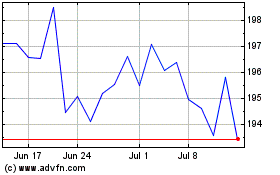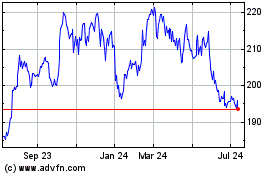UPDATE: US Official Says Treasury 'Very Close' To Decision On FX Swaps, Forwards
April 12 2011 - 6:03PM
Dow Jones News
A senior U.S. Treasury official said the Treasury is "very
close" to deciding whether to exempt foreign exchange swaps and
forwards from a raft of new rules for the over-the-counter
derivatives market.
Asked about the decision at a U.S. Senate hearing Tuesday,
Assistant Treasury Secretary Mary J. Miller said she regretted she
didn't have a decision to announce yet.
Last year's Dodd-Frank law aimed to push over-the-counter
derivatives transactions onto trading platforms and route them
through clearinghouses, which guarantee trades. Today, swaps are
mostly customized transactions between two counterparties conducted
off exchanges and away from regulatory scrutiny. The law gives the
Treasury secretary authority to exempt all foreign exchange swaps
and forwards from the new regulations.
Treasury could announce the decision by the end of the month,
with officials eager to provide clarity to regulators at the
Commodity Futures Trading Commission who are seeking to finalize
its derivatives rules by July, as the Dodd-Frank law requires.
It is also widely expected that Treasury will endorse some form
of exemption, in part because Treasury Secretary Timothy Geithner
expressed his support for such a move when the rules were being
written. He argued in a December 2009 appearance on Capitol Hill
that the products are "not really derivatives in this sense, and
they don't present the same set of risks."
Sen. Richard Shelby of Alabama, the Senate Banking Panel's top
Republican, pressed Miller about whether there is a need for more
regulation of such foreign exchange transactions. "Are you aware of
any failures in that area that would justify further regulation?"
he asked.
"I think there were many parts of that market that were under
severe financial stress during the financial crisis and some parts
of it will be subject to Dodd-Frank regulation," Miller said.
Lawmakers at the hearing asked regulators about their
rule-making process. Sen. Bob Corker (R., Tenn.) asked CFTC
Chairman Gary Gensler whether a proposal to allow large derivatives
trades a 15-minute delay before a real-time reporting requirement
kicks allows market players enough time.
Gensler said the proposal was meant to keep promote
transparency. "I think markets work best when they're transparent,"
he said.
Shelby, in his opening remarks, criticized the CFTC and SEC for
not proposing rules spelling out the definition of a swap, which he
argued was an essential step before the regulators could finalize
other rules.
"This is just one example of how Dodd-Frank has created a
confused derivatives rulemaking process that is not proceeding in a
logical order and creates significant uncertainty in our markets,"
he said.
Industry representatives, in a second panel, took aim at certain
moves by regulators to implement the rules.
CME Group Inc. (CME) Executive Chairman Terrence Duffy in his
prepared remarks blasted the CFTC for what he called the
regulator's "almost complete reversion to a prescriptive regulatory
approach." Duffy argued the CFTC has wrongly applied the Dodd-Frank
law to propose specific requirements for futures regulations that
are meant to be rooted in core principles.
The regulator has become a "front-line decision maker that
imposes its business judgments on the operational aspects of
derivatives trading and clearing," Duffy said.
-By Jessica Holzer, Dow Jones Newswires; 202-862-9228;
jessica.holzer@dowjones.com
--Michael R. Crittenden contributed to this article.
CME (NASDAQ:CME)
Historical Stock Chart
From May 2024 to Jun 2024

CME (NASDAQ:CME)
Historical Stock Chart
From Jun 2023 to Jun 2024
